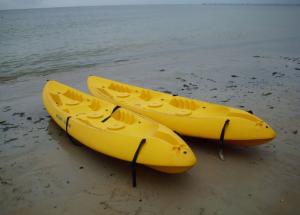Kayaker shares story of Dewey tri rescue effort
The kayaker who first noticed a swimmer in distress during the Dewey Beach Sprint Triathlon says the participant was brought ashore less than three minutes after he was discovered unconscious.
The athlete, Steve Linthicum, 46, of Westminster, Md., died a day later, Sept. 18, at Beebe Medical Center in Lewes. Linthicum competed in last year's event and finished 11th in his age group with a time of 1:11:42.
Rehoboth Beach resident Bob Hughes discovered Linthicum in the water. He was patrolling the swim on a kayak near the final buoy when he found Linthicum unresponsive. Linthicum had apparently stopped midway through the swim and talked with a lifeguard, he said.
“He was only 250 feet from finishing the race,” Hughes said. “If he had made it another 75 feet, he would've rounded the buoy and gone to shore.”
Hughes said he was no more than 150 feet away from Linthicum when he noticed he was not moving. He and a lifeguard were able to respond within about 30 seconds. A small group of participants also stopped to help, he said. Because the man appeared unconscious, the lifeguard left his rescue board and immediately swam him ashore. A participant swam the board ashore, and Hughes stayed behind to fill in for the occupied lifeguard.
“He had a challenge on his hands, swimming in with an unresponsive person twice his size through choppy surf,” he said. “I thought he managed to do an exemplary job.”
Once on shore, Hughes said, the lifeguard immediately began CPR. Medical personnel brought a defibrillator to the shoreline in an attempt to revive Linthicum, Race Director Ava Cannon said.
Beebe Medical Center Director of Marketing and Communications Kelly Griffin said the defibrillator used was not from the center's medical assistance area. Beebe's Community Health Department provided a basic first aid station that dealt with cuts, abrasions, and dehydration, she said. The medical area was staffed by licensed, registered nurses.
Seventeen lifeguards were spread out on the beach and in the ocean with rescue boards. Hughes said he doesn't believe the rescue attempt could've gone any faster with other equipment such as jet skis. The guard was well equipped, he said.
“It was the exact thing he needed to respond to this guy,” he said. “He had a float and rescue board. This is the equipment they're accustomed to working with.”
Hughes's job was to keep swimmers on the right path and keep an eye out for anything out of the ordinary. He's worked in nearly 50 triathlons and swims throughout the region, but this was the first time he experienced a death.
Race officials are still in the process of gathering fact-based information from the medical team that treated Linthicum, Cannon said.
Hughes said there is no one to blame.
“Everybody wants to point fingers,” he said. “It's not enough that this was a tragedy that was unforeseen. It could've happened anytime. People should be talking about the excellent job the lifeguard did bringing the guy in.”
Linthicum was the father of two boys, Benjamin and Zachary. He is also survived by his wife Angela, his parents and brothers. Linthicum was a 1987 graduate of Towson State University; he worked as a regional production manager for Ryan Homes for 24 years.
According to a study by the Journal of the American Medical Association, sudden deaths in triathlons are not uncommon, because the event is among the most vigorous athletic activities.
Published reports say two swimmers died at the New York City Triathlon Aug. 7, and at least one of the two victims suffered an apparent heart attack. In 2008, an Argentinian man died after an apparent cardiac arrest during the swim portion of the same race.
Between January 2006 and September 2008, the JAMA study found 13 of 14 recorded deaths were during the swim portion of the race. The deaths were not related to any particular length of swim either; six of the 13 deaths occurred during short swims - less than 750 meters, or just under a half a mile. The Dewey triathlon calls for a half-mile swim.
Rehoboth Beach Patrol Capt. Kent Buckson, whose guards have worked the event in previous years, says it's not uncommon for athletes to have trouble during the swim, especially if conditions are rough.
“If you're not used to those conditions, it would definitely raise your stress level,” he said. “I'm sure everybody was anxious.”
Buckson competed in the triathlon and said the swim was definitely difficult.
“Everybody had to exert a lot more energy and concentrate harder to get through that swim,” he said. “You couldn't really get in a smooth rhythm. It was a constant up and down with water hitting your face.”
Nick Roth is the news editor. He has been with the Cape Gazette since 2012, previously covering town beats in Milton and Lewes. In addition to serving on the editorial board and handling page layout, Nick is responsible for the weekly Delaware History in Photographs feature and enjoys writing stories about the Cape Region’s history. Prior to the Cape Gazette, Nick worked for the Delmarva Media Group, including the Delaware Wave, Delaware Coast Press and Salisbury Daily Times. He also contributed to The News Journal. Originally from Boyertown, Pa., Nick attended Shippensburg University in central Pennsylvania, graduating in 2007 with a bachelor’s degree in journalism. He’s won several MDDC awards during his career for both writing and photography. In his free time, he enjoys golfing, going to the beach with his family and cheering for Philadelphia sports teams.























































